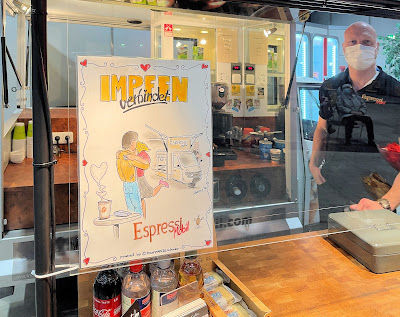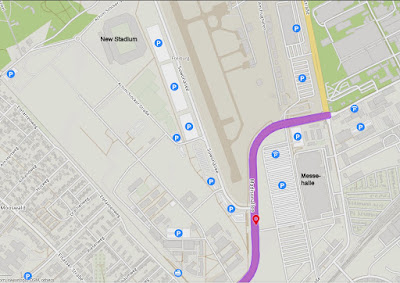*Not to be confused with Johann Eck, Luther's other theological opponent
Red Baron got his first Pfizer/BioNTech jab on January 7 at 8:30 a.m. Exactly three weeks later* on January 28, at 8:30 a.m., he was invited to the second and decisive shot against Covid-19.
*German precision?
January 28 is a historical date for on this day in 1517, the above-mentioned Imperial diet began at Worms.
It is my Saint's day, i.e., instead Blessed Manfred's day.
The name Manfred means "man of peace." This is derived from the Alemannic "man" for man and "fridu"' (Frieden) for peace.
As far as the "blessing "is concerned, we read in the German Wikipedia (translated), "Manfredo Settala, Blessed Manfred of Riva or Beato Manfredo (born 12th century Milan; † January 28, 1217, in Riva San Vitale on Lake Lugano, according to other sources 1450) was a priest and hermit."
Finally, January 28 is a historic Covid-19 date for Germany. In 2020, a brief press release from the Bavarian State Ministry of Health and Care read, "A man from the district of Starnberg has been infected with the novel coronavirus," adding that he is "clinically in good condition" and "The risk for the population in Bavaria to become infected with the novel coronavirus" is "currently considered low."
 |
| ©dpa |
The Covid-19 chronology went as follows:
December 2019: The first infections became known in Wuhan, China.
January 5, 2020: The World Health Organization (WHO) emails the German Joint Federal and State Reporting and Situation Center warning of a "cluster of pneumonia" in Wuhan.
January 9: Experts identify a new coronavirus as the causative agent.
January 11: China's authorities report the first death and seven patients in critical condition.
January 14: The new coronavirus is detected abroad for the first time in Thailand.
January 20: Chinese experts report that the coronavirus is transmissible from person to person. There are now 200 confirmed infections and three deaths in China.
January 25: The coronavirus reaches Europe, with three cases reported in France.
January 26: Germany's Robert Koch Institute, the R.K.I., classifies the Chinese province of Hubei as a risk area. More than 43 million people in China will soon be largely isolated from the outside world. Evidence shows the virus has now reached the U.S., Japan, South Korea, Vietnam, Nepal, Singapore, Taiwan, and Australia.
January 27: When the first German case at Webasto is confirmed, the global death toll is already at 80, with 2,744 cases in China and about 50 more in the rest of the world.
February 11: The disease gets a name: WHO calls it Covid-19,
February 12: Germany's Health Minister Jens Spahn said it is "currently not yet foreseeable whether a regionally limited epidemic in China will develop into a worldwide pandemic or not."
March 11: The WHO officially declares a global pandemic.
How did my second vaccination go?
Today, more people than on January 7, queuing in a double line, counting both first and second jab customers.
More booths for vaccination were open, with people waiting for about five minutes.
Finally, I arrived at the Ausgang to enter the Ruhezone (rest area) for a stay of 15 minutes.
The Ruhezone was more occupied than three weeks ago. The gentleman in
front of me is not Bernie with mittens but
Bernhard mit Schirm auf dem Schoß.
While waiting, I took my usual (?) espresso. The patron of the kiosk was interviewed by the Badische Zeitung the other day, stating that most old gentlemen are looking for espressi following their jabs. Q.E.D. and Amen.
 |
| ©Pfizer/BioNTech |
As the above graphic suggests, I hope I am now protected against the coronavirus.
*























